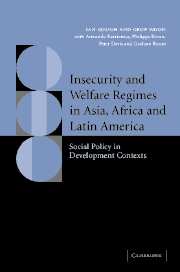 Insecurity and Welfare Regimes in Asia, Africa and Latin America
Insecurity and Welfare Regimes in Asia, Africa and Latin America Published online by Cambridge University Press: 04 August 2010
Introduction
This chapter argues that the poorer regions of the world do not comfortably conform to the two key assumptions upon which the OECD model of welfare state regime relies: a legitimate state; and a pervasive, formal sector labour market. This immediately sets up the two key interactive issues of governance and the socio-economic circumstances of the common man (and woman). These circumstances are understood in this chapter through the metaphor of the peasant (to capture the significance of reproduction, family and household-level inter-generational transfers) and the analysis of clientelism as pervasive adverse incorporation (comprising hierarchical rights; meso-level intermediation with the national-level polity and economy; and quasi-public goods social capital, organised through unequal relationships). These political, economic, social and family dimensions are brought together in this book, for policy analysis purposes, as the institutional responsibility matrix with global as well as domestic dimensions. These four institutional domains are presented as permeable, which can have positive or negative outcomes for different societies. The world's poor regions are characterised by negative permeability in which the level of personal objectives penetrates the level of public aims to produce poor governance and insecurity for the majority of their populations, thus removing any prospect of the corrective principle, in which the state regulates the market for social objectives. Only partial compensation for this absence of the corrective principle is offered by global discourses, conditionality and debt remission leverage.
To save this book to your Kindle, first ensure [email protected] is added to your Approved Personal Document E-mail List under your Personal Document Settings on the Manage Your Content and Devices page of your Amazon account. Then enter the ‘name’ part of your Kindle email address below. Find out more about saving to your Kindle.
Note you can select to save to either the @free.kindle.com or @kindle.com variations. ‘@free.kindle.com’ emails are free but can only be saved to your device when it is connected to wi-fi. ‘@kindle.com’ emails can be delivered even when you are not connected to wi-fi, but note that service fees apply.
Find out more about the Kindle Personal Document Service.
To save content items to your account, please confirm that you agree to abide by our usage policies. If this is the first time you use this feature, you will be asked to authorise Cambridge Core to connect with your account. Find out more about saving content to Dropbox.
To save content items to your account, please confirm that you agree to abide by our usage policies. If this is the first time you use this feature, you will be asked to authorise Cambridge Core to connect with your account. Find out more about saving content to Google Drive.